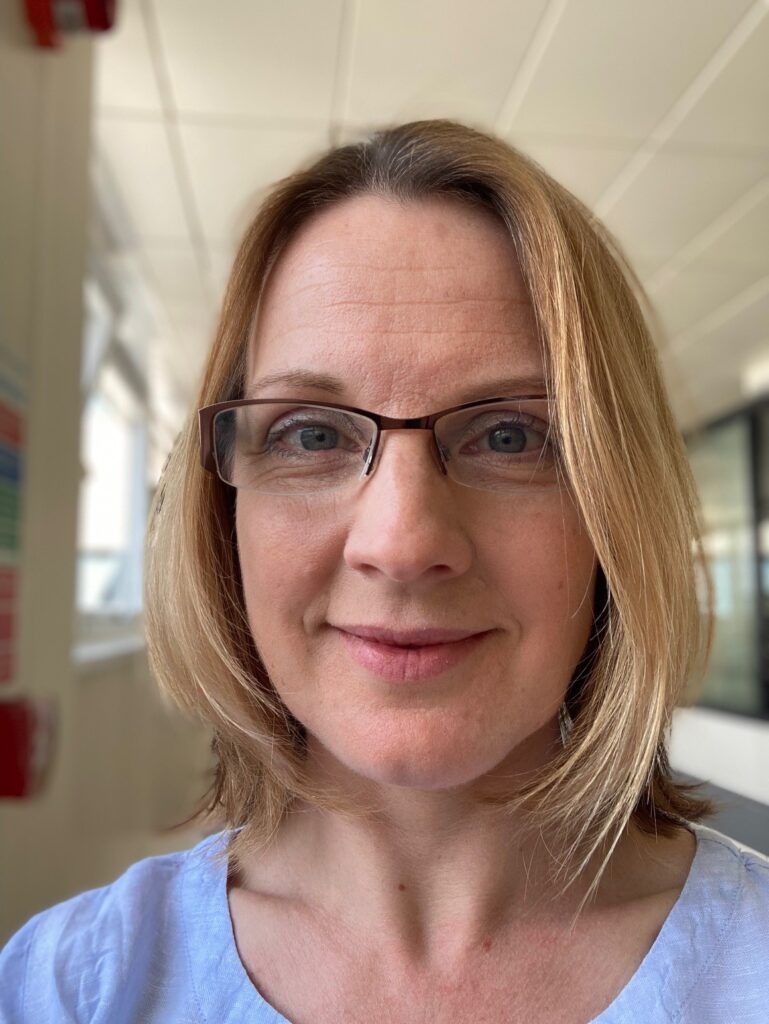Lizzie Stafford, a Clinical Research Nurse Manager in the Nuffield Department of Medicine, has been involved in number of Oxford BRC-supported research studies. The BRC is funding the second year of her NIHR postgraduate clinical research programme.

“I’ve been involved in some ground-breaking clinical trials, and to see that over the following few years translate into standard treatment for people and know that you’ve seen it through from the beginning, that’s a really exciting and privileged position to be in. That’s the rewarding part of research.”
For 11 years, Lizzie Stafford worked in Oxford BRC-funded hepatology research for Oxford University Hospitals. Among the studies she worked on were new treatments for hepatitis C.
But then, when the COVID-19 pandemic struck in 2020, all non-COVID research was halted, and Lizzie was redeployed to a local research project tracking COVID infection in healthcare workers. This OPTIC study fed into the larger PITCH study, involving a consortium of five universities led by Oxford that have been following cohorts of healthcare workers for the last three years.
Her involvement in the PITCH study meant Lizzie moved across to the University of Oxford, where she is managing a team delivering the PITCH studies, including the VIBRANT study, which looked at whether people’s background made them more susceptible to severe infection than others.
Lizzie and her team have just launched STRAVINSKY, a major new study looking at whether antibody measurements can predict which people with weakened immune systems are at greatest risk of COVID-19 illness after vaccination. The aim of the study is to provide detailed, up-to-date information on the impact of booster vaccinations in the vulnerable population. The samples collected as part of the OPTIC healthcare workers study will also serve as the control group for the Stravinsky study.
Lizzie is grateful for the support she has received from the Oxford BRC. Not only has much of the research she has managed been funded by the BRC, but she also took part in the BRC’s Next Generation Leaders course, which was unfortunately interrupted by the pandemic.
“I was really impressed with the course; it was really helpful. I took a lot away from that opportunity,” she says.
“So much of what we do is underpinned by the infrastructure of the BRC. There’s no doubt we couldn’t do the projects we do without the infrastructure the BRC provides.”
The BRC had previously offered Lizzie some funding to do further study, but she had to turn it down at that time for family reasons.
“This time round, it was great to be able to say yes,” she says.
Lizzie is enrolled on the NIHR’s postgraduate clinical research programme with Newcastle University, The postgrad certificate was relaunched last year alongside Exeter University. Lizzie has already completed the first year’s study and a bursary from the BRC is funding her second year at diploma level.
“It was such a great opportunity,” Lizzie explains. “I was desperate to do some postgrad study but when you’re working full-time with young children, family life etc, it’s hard to know where to fit it in. But it looked like a programme I would really enjoy, it was perfectly suited to my role, and it was designed for people who were actively working – not a course where you had to take a break from your job, but something you could do flexibly alongside your job, which makes it more manageable.”
“It’s given me an opportunity for the first time to do some serious study. I’m not going to pretend it’s easy to fit in, but I have enjoyed the study, I have enjoyed the content and I think it’s a worthwhile thing to be pursuing. Having completed year one and been provided with the funding for year two through the BRC, the momentum is there, and I’ve signed up with more confidence to year two.”
If Lizzie successfully completes a third year, she will have a Master’s in Clinical Research.
Lizzie’s role is fully research – unlike purely clinical roles, it allows her to work more predictable hours, which is currently better for her family – and her studies.
But she points out that there is a great deal of patient care in the work of a research nurse.
“When you’re working with patients on an NHS pathway you don’t feel that you are not clinical. You engage with them and support them, and you can become a powerful patient advocate, especially when you see patients regularly for follow-up appointments. You build up a great relationship with them, and you get a real insight into what it’s like to live with their condition. Despite my fears at the outset, I’ve never really felt like I’ve left clinical work,” she says.
“I would love to see more hybrid research-clinical positions, where we make it possible for clinical staff to have protected time to engage in clinical research, so that we really embed research activity into clinical care, and they are not seen as separate career options. I would encourage anyone who had the possibility of doing that to do it. So much of what we do in research, you see the impact in clinical care. It’s all part of the same circle.”